ARTICLE AD BOX

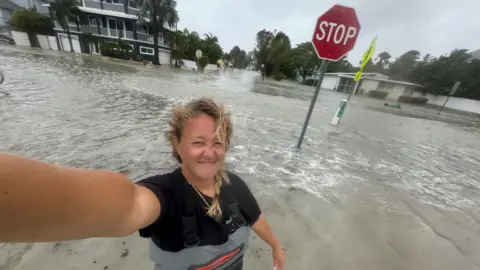 Briana Gagnier
Briana Gagnier
Briana Gagnier says the streets look like white water rapids
Wading through the waist-high water that used to be a street, Briana Gagnier tells BBC News that in her 12 years of living on Holmes Beach she's never seen such strong storm surge.
"It looks like whitewater rapids outside," the 29-year-old said over the phone.
"It's so strong and you can see everything being carried away - chairs, cushions, coolers, garbage."
Ms Gagnier was getting a preview of Hurricane Helene, which was barrelling towards Florida on Thursday night as a category four storm with wind speeds of up to 130mph (215 km/h) and deemed "extremely dangerous" by the National Hurricane Center.
Authorities warn it could bring a "catastrophic" and "unsurvivable" storm surge, where inundations could reach as high as 20 ft (6m).
She watched the storm quickly strengthen from a tropical storm into a category four hurricane but said she felt she needed to stay behind and try to protect her one-story home, which sits on a barrier island off Florida's Gulf Coast.
"The water is already in our garage," she said. "We have every sandbag possible at every door - anything to help stop it from coming inside."
Ms Gagnier said while walking through the area, she saw basically every home along the coast with water flowing inside.
"You see images like this on the news but I've never seen it in my backyard."
"It's eerie."
Anna Maria Island resident ML Ferguson told BBC News that homes and businesses were seeing water gushing into buildings as the hurricane approached.
The streets now look like rivers, she said.
Water quickly overwhelmed the beachside bar where she works - the Bridge Tender Inn Dockside & Tiki Bar - with waves splashing the sign and chunks of seaweed clumped near tables.

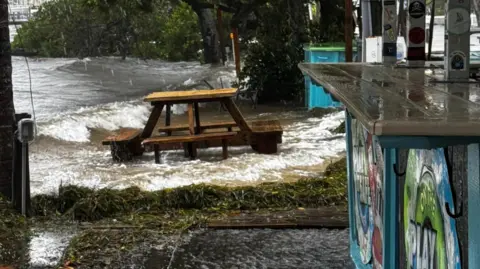 ML Ferguson
ML Ferguson
The storm was already battering the bar where ML Ferguson works

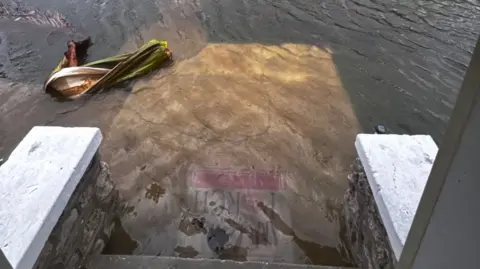 ML Ferguson
ML Ferguson
Water was rising on ML Ferguson's porch on Thursday
"We are resilient," she said. "We keep an attitude of 'and this too shall pass.'"
By the time she returned to her home, water was starting to creep up her porch.
"Oh my gosh, it's literally up to the second step," she told BBC in phone interview. "My house is about the flood."
Ms Ferguson quickly moved some tables so she could put things on top of them to prevent the floodwaters from ruining belongings.
But while she spoke to BBC News a person drove down her street, causing a wake of water that splashed inside.
"The water is already coming in," she exclaimed before rushing off the phone to try to stop it.
Cainnon Gregg, an oyster farmer in Wakulla County on Florida’s Big Bend, spent the last few days trying to protect his farm by sinking it onto the ocean bed.
His farm was destroyed once before, during Hurricane Michael, a category five hurricane that hit the Florida panhandle in 2018, and Mr Gregg said he is determined to learn from that lesson.
“Hopefully, and nothing is for certain, the farm is sitting nice and safe on the bottom,” he said. “But anything could happen.”
To weather the storm, Mr Gregg plans to hunker down in his hometown of Tallahassee with a friend who has a shelter.
The city is also in the hurricane’s projected path, and it has not experienced a storm of this magnitude in recent memory.
“Right now it’s pretty much a ghost town. Everything’s closed. Everything’s boarded up.” he said.

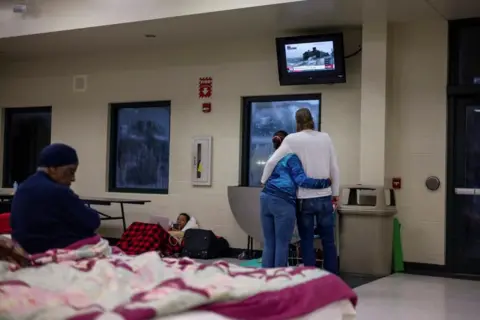 Reuters
Reuters
Evacuees in a Florida emergency shelter await news
Denise O'Connor Badalamenti has seen countless hurricanes in her decades living in Florida, but Helene has her more on edge than ever before.
"I think this is going to be the one," the 62-year-old told BBC News from her Bradenton home, which sits just a few streets from the water, as the storm moved closer to making landfall.
"I feel like we're always in the cone of possibly being targeted but then get sparred at the last minute but I don't think we're going to lucky again."
Her mother's home has flooded six times over the years and this morning water was already creeping up their driveway. Her family has taped up all the doors shut, hoping to stop any flooding.
"This one is just massive. It's scary," Ms O'Connor Badalamenti said.
Following the guidance of emergency officials, she said has stockpiled supplies and has an assortment of food ready if they lose electricity.
"We're ready for the worst."
Michael Bobbit, a clam farmer on the island of Cedar Key on Florida's Big Bend, said that some people in his community have decided to stay behind despite the warnings.
“The last several hours have really just been a frantic effort to beg people to leave,” Mr Bobbit, 48, told the BBC on Thursday, before the storm made landfall.
“Here in Florida, we sort of believe that we’ll just ride it out, it’s no big deal. But this is not one of those storms.”
He added that locals have been trying, "to sandbag as many buildings as we can", as well as board up windows and get the island's clam farms secured.
"The mood is sombre," Mr Bobbit said.
"A lot of people when they’re leaving the island are hugging each other and crying, saying ‘I hope we have a home to go back to.'"

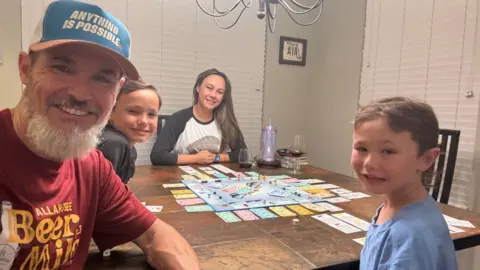 Mickey Moore
Mickey Moore
Mickey Moore plays Monopoly with his family as they await the storm
Mickey Moore, 54, has lived in his home in Tallahassee for about 15 years and the worst he's seen coming from a hurricane was his power going out.
This one, he said, has him concerned.
His home is about 20 miles (32km) from the Gulf of Mexico - and right in the storm's path.
"A category four - it's just so big," he said, taking a break from a game of Monopoly with his two sons and his wife.
"We've been fortunate in past storms," he adds. "We don't take it for granted."

 2 months ago
13
2 months ago
13
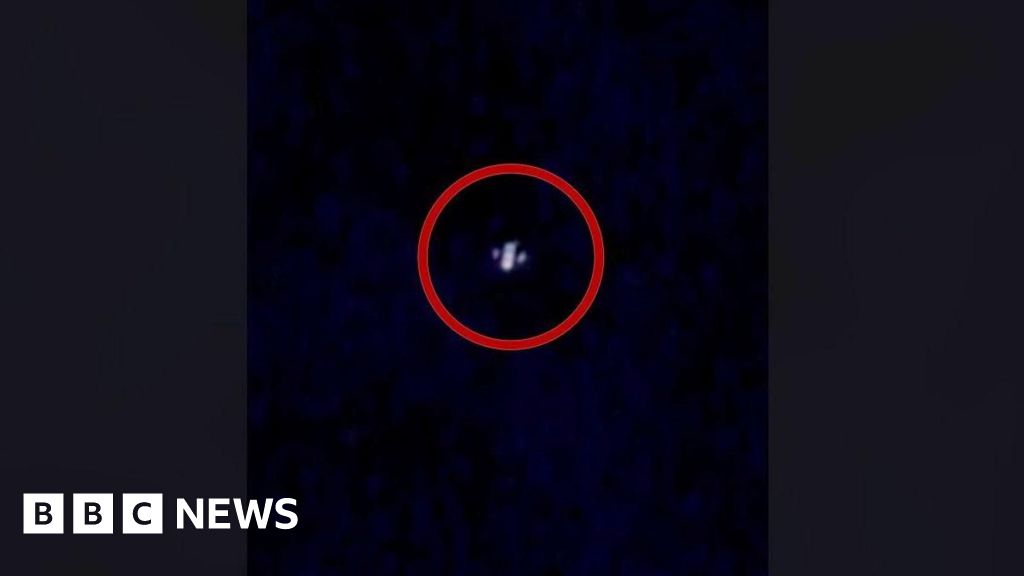

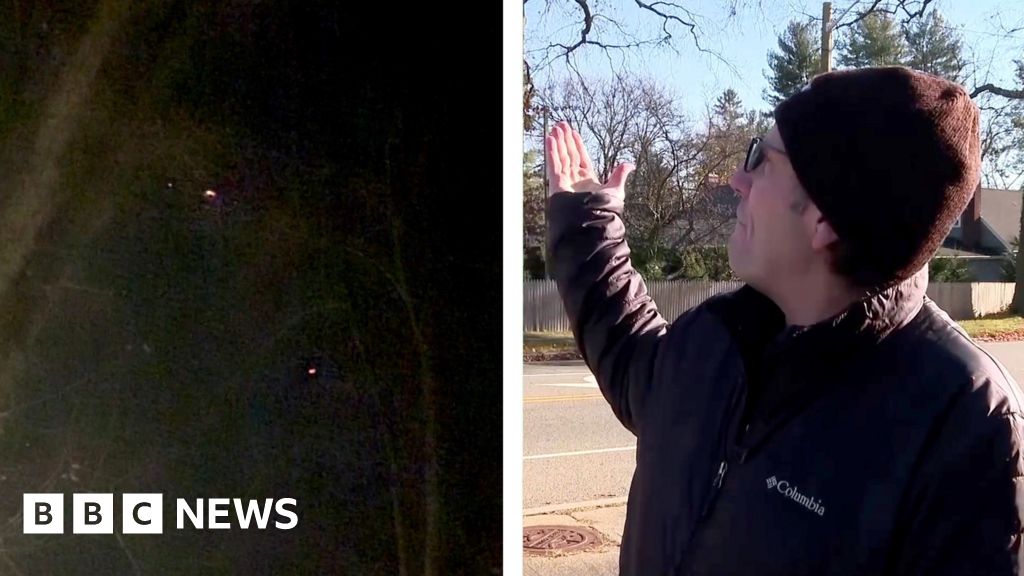





 English (US) ·
English (US) ·